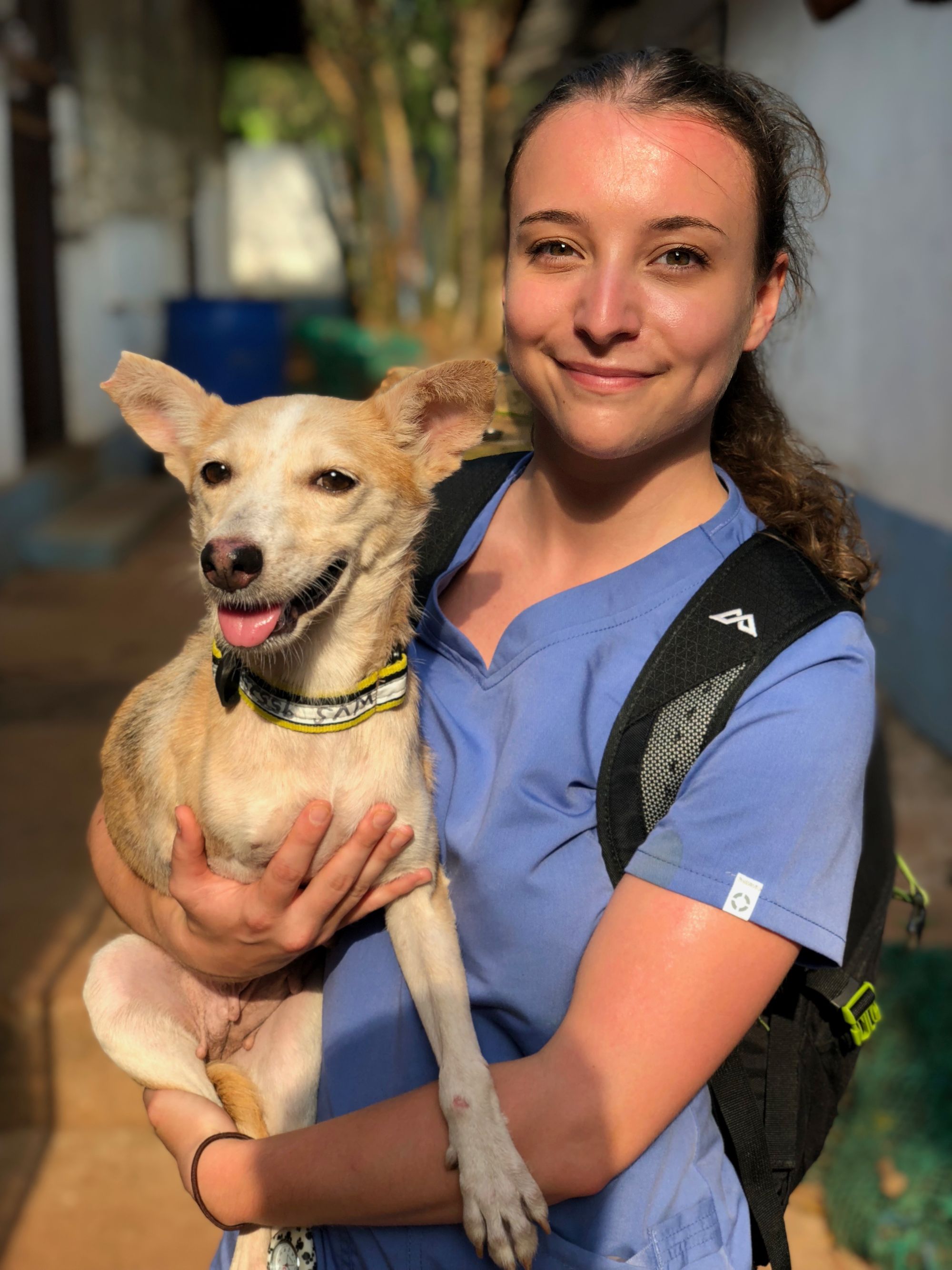Sammie, a veterinary student from the UK, took part in a surgical course at our International Training Centre (ITC) in India. She is here to tell you all about her experience in Goa.
"India is an incredible country, and while Goa might be its smallest state, it still has so much to offer! From the beautiful beaches to the historic old town, there is plenty to see and enjoy in the available free time. The drive from the airport to the ITC showcases some beautiful scenery. The ITC itself is in the village of Assagao, which is also the place I called home for the next two weeks."

Life in the Indian state of Goa
"When you wander the streets of Assagao, you see many free-roaming dogs. The stray dog population here is overwhelming, especially compared to the UK, where we have a relatively very small stray population. Many of these dogs have ear notches, which means they've been neutered and vaccinated against rabies by the charity. The sheer number shows the great job that WVS is doing in this area!"
My daily routine
"An average day on-site consisted of kennel rounds, preparing patients for surgery, and doing spay/neuter surgeries. You have a partner for the course, so whilst one of you operates the other monitors the anaesthetic, then you swap. Ward rounds consisted of examining the dogs that were operated on the previous day, paying particular attention to their pain and wound score. Based on this examination, it is decided if the dog is fit for release. After this, the first set of dogs for surgery are given their pre-medication. Once the dogs are sufficiently sedated, they are moved to the prep area – which is constantly a hive of activity! Here the dogs are weighed, clinically examined, clipped, scrubbed, IV access is established, and the dog is induced. At this stage, the animals are given multi-modal analgesia, IV fluids, Ivermectin, and anti-rabies vaccination. Post-induction, the dogs are moved through to the theatre where they are intubated and undergo their final scrub before surgery. Once the surgery has been completed, it is the surgeon’s job to recover the animal in its kennel before they return to be the anaesthetist for the next surgery."

Gaining hands-on experience
"Prior to attending the course, I had scrubbed in on a couple of surgeries, but I hadn’t performed a spay. By the end of the two weeks, I could confidently complete a spay with minimal to no assistance. The surgical experience, both in terms of skills and confidence, that I gained on this course has been invaluable. Whilst the anaesthesia protocols used in India are very different from what is used in the UK, the patients are the same. Anaesthesia monitoring is a huge part of veterinary work, and the course aims to make vets more familiar with clinical parameters during anaesthesia and what to do if the parameters are abnormal."

Making the most of leisure time
"The weekend is split between leisure time and veterinary work."
"We were given the opportunity to assist WVS' sister charity Mission Rabies with their fieldwork. They were vaccinating dogs against rabies in one of the rural villages and needed a hand. Working together in a few hours, we managed to vaccinate 77 free-roaming and owned dogs."
"The Mission Rabies teams do this every day, regardless of the weather, vaccinating all dogs seen and educating the local people about rabies. They work incredibly hard, and thanks to their efforts, there has been a reduction in the rabies-related fatalities."
"I also had the privilege of visiting the charity's All-Terrain Clinic as it was parked in a nearby rural village. The truck is the only one of its kind and is equipped with a teaching area, kitchen, x-ray facilities, a prep area and a theatre. It is actually better equipped than some first opinion vet practices in the UK! It spends most of its time travelling to remote villages in India to carry out a vaccination and sterilisation programme. The unique project has had an incredible impact on rural communities and will continue to do so long into the future."
"Then, on Sunday, we spent the day relaxing at one of Goa’s many beautiful beaches – definitely well worth a visit!"

Participating in lectures
"Throughout the course, there were four lectures. My favourite lecture was about the management of traumatic wounds, which gave very practical advice about how to treat common presentations such as burns and large wounds unable to be closed surgically. I have already used some of the techniques I learnt at WVS in clinical practice back in the UK, and I will no doubt continue to do so throughout the rest of my veterinary career."

Train with us like Sammie
"I learnt so much working with WVS. The course is so hands-on for both surgery and anaesthesia, making this an incredible opportunity for veterinary students and recent graduates. The course leaders are so passionate about animal welfare and improving veterinary education, which really shows in this course, and I truly felt welcomed into the WVS family during my stay. I’d love to work with WVS again in the future, and I wouldn’t hesitate to recommend the course to anyone!"
If you’ve been inspired by Sammie's experience and feel ready to participate in one of our surgical training courses, take a look at the dates available at our International Training Centres across India and Thailand. If you are an international participant, apply here, and if you are a local participant, apply here.